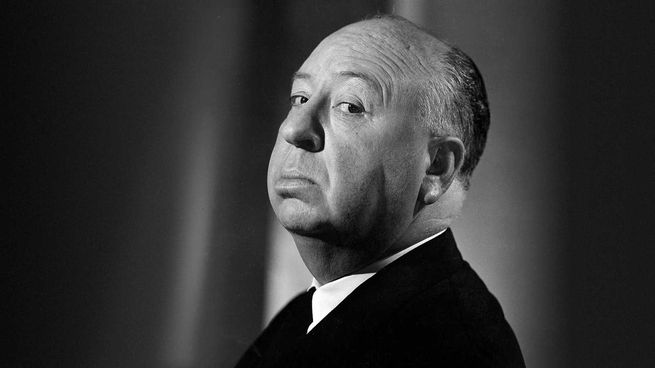One of his most famous phrases (which he enunciated when giving an interview about “Psycho”) was: “I don’t direct my actors, I direct the public.”
“Well, it was very impressive, I must tell you: there was blood everywhere”. Those were the words that Alfred Hitchcock he snapped at the film director Peter Bogdanovich when this was not his colleague but a young journalist who admired him and interviewed him for the first time. It was the year 1964, Hitchcock had recently released his greatest hits, such as “Vertigo” (1958), “International Intrigue” (1959) and “Psycho” (1960)and his television show, which he hosted in person, had made him a global celebrity, one of the few directors who were immediately identifiable by the public without appearing as an actor in his films (except for his famous “cameos” , which he always placed at the beginning of the film so people wouldn’t get distracted waiting for it).
The content you want to access is exclusive to subscribers.
One of his most famous phrases (which he enunciated when giving an interview on “Psycho”) was: “I don’t direct my actors, I direct the public”. Indeed, each time that classic is seen again, the extraordinary way of manipulating the viewer’s gaze that Hitchcock practiced in assembling it is rediscovered; a black and white classic so many times imitated (or recreated) without the same effect. Not only was the star of the film, Janet Leigh, killed in the first few minutes, something impossible to imagine in the star system of the time, but also no one in the film, not even Marion Crane (name of her character) herself, managed to empathize with the public. “Psycho” had no characters to identify with, and that made it, by the standards of the time, even more tense, more desperate.


But let’s go back to that first meeting between Hitchcock and Bogdadovich. It happened at the St. Regis Hotel in New York, the city where the journalist lived, and which the famous filmmaker, who had been living in Los Angeles since the early 1940s, visited as part of a promotional tour for a new release. “It was very impressive, I must tell you: there was blood everywhere.” Bogdanovich himself tells the story, in the chapter he dedicated to Hitchcock in his book of biographies “Who The Devil Made It?”, where he also transcribes his reports .
That happened in the back of the elevator at the St. Regis, which was taking them from the top floor to the lobby, where they were going to share dinner. “She had a slight blush on her cheek from the several frozen daiquiris she had just drunk in her suite, and until then, she had remained placidly silent,” he recounts. They were accompanied by their respective wives, Alma Reville, the wife and longtime collaborator of the “Rebecca” director, and Polly, Bogdanovich’s. The four of them entered the elevator alone, and Hitchcock was silent. He had just spoken when the elevator stopped on the next floor and three people dressed in evening clothes got on to go to the dining room. “Hitchcock sounded like he was mid-sentence, and projecting his voice (in that familiar TV tone of his) just enough so no one could miss a word.” And he went on to say, “There was a stream of blood coming out of his ear and a stream of blood coming out of his mouth. Horrible stuff, Bogdanovich.”
The elevator passengers recognized Hitchcock immediately. It had been about a decade since he had presented his television show. However, unlike what would have happened in any other country, especially Latin, no one tried to greet him or interfere. They all looked down, as if embarrassed to hear someone else’s conversation. “I felt a bit confused,” Bogdanovich says. “In his suite, the most famous director in movie history had chided me for not drinking my frozen daiquiri. I didn’t usually drink alcohol, but to avoid upsetting him I did, and then I wasn’t sure if he was hallucinating what I was hearing from him or what. Polly was looking at him strangely, too.
Hitchcock’s expression didn’t change at all and he continued speaking, “gazing beatifically ahead as the elevator stopped again and another well-dressed couple ascended.” He continued: “Of course, there was a huge pool of blood on the floor and his clothes were splattered… I swear it was a mess, an awful thing. Well, you can imagine…”
Bogdanovich adds: “It seemed to me that no one was breathing in the elevator. Alma smiled slightly as Hitch looked at me with bright eyes; I nodded silently and he continued: ‘Blood everywhere! I looked at the poor man and said: ‘My God, what happened to you?’, And what he said to me left me cold. You don’t even know who shot you.”
At that moment, the elevator doors opened on the ground floor and Hitchcock added, “You can imagine, right?”, then paused. Nobody moved in the elevator despite the fact that there were people on the other side waiting to get on. As Hitchcock remained silent, despite them, the other passengers began to leave the elevator and were trying to sneak past Hitchcock through the lobby, trying to hear the outcome, but he remained silent as they searched for the restaurant to go there. When the four of them were finally alone, Bogdanovich couldn’t take it anymore and asked him: “But who were they, for God’s sake?” Hitchcock gave him a look with bright eyes and replied: “You are not going to tell me, Bogdanovich, that you also believed it… You are a professional, you cannot fall into this trap. This is my elevator gag. It never fails”.
The author of the book concludes by saying that Hitchcock never stopped directing the public, and that this staging in the elevator (which he repeated hundreds of times, which is why he always asked to stay on the top floor of hotels, to go down with the journalists, or whoever, just as he had done with Bogdanovich) was living proof of that drive. “I don’t need to see my films with the public,” he said in that interview. “I already hear them when I’m filming. Think of someone like Picasso, who does double profiles and has been through cubism and God knows what else, but he knows every muscle in the human body. If you ask him to draw the figure of a man or a woman, there won’t be a muscle out of place. You have to know the trade to be able to express art.”
“Do you think about posterity?” Bogdanovich also asks him. “Not because? What has posterity ever done for me?”.
Source: Ambito
I am an author and journalist who has worked in the entertainment industry for over a decade. I currently work as a news editor at a major news website, and my focus is on covering the latest trends in entertainment. I also write occasional pieces for other outlets, and have authored two books about the entertainment industry.




